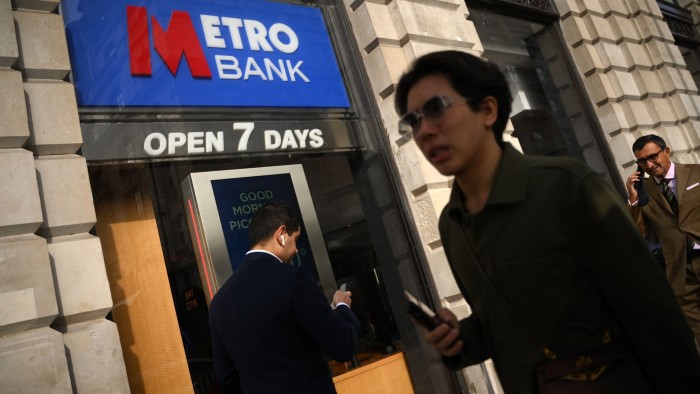Stay informed with free updates
Simply sign up to the Investments myFT Digest — delivered directly to your inbox.
Metro Bank has had a chequered past. Last week, it was fined £16.7mn by the banking watchdog for financial crime failings between 2016 and 2020.
This wasn’t its first regulatory scrape. In 2021, Metro had to pay £5.4mn because of issues with its regulatory reporting, and the following year was hit by a £10mn fine for publishing incorrect information to investors.
Meanwhile, profits have proved elusive. An underlying loss of £16.9mn last year swelled to £26.8mn in the first half of 2024, and management has cut more than a fifth of the workforce and reduced store hours to address the problem.
There was a major development in July, however, when Metro sold £2.5bn of mortgages to NatWest. Analysts believe the cash from the deal can be recycled into high-yielding loans, which should boost performance in the medium term.
Metro agrees, saying net interest margins in 2024, 2025 and 2026 should approach 2.5 per cent, 3.25 per cent and 4 per cent respectively. Return on tangible equity could also reach double-digits by 2026 and “mid-to-upper teens thereafter”, it said.
Past performance casts doubt over the new targets, and broker Peel Hunt warned that the path to double-digit returns is “speculative”. Underlying profitability returned in October, however, and the market has reacted well: shares have risen by 160 per cent since January.
Metro’s management team is also putting more skin in the game. Non-executive director Cristina Alba Ochoa — who was the bank’s interim finance officer until last month — bought almost £200,000 of stock this month, at roughly 90p a share. Chair Robert Sharpe has also increased his stake, after he purchased £27,000-worth of shares on November 14.
Metro is 53 per cent owned by Spaldy Investments, controlled by Colombian billionaire Jaime Gilinski Bacal.
Sirius Real Estate chief shows faith in Germany
Sirius Real Estate has been looking cheap for some time. Despite increasing its dividend for the 22nd consecutive period in November, it trades on just 12 times forward earnings.
The property company, which owns a €2.4bn (£1.9bn) portfolio across the UK and Germany, posted solid half-year results last week. Pre-tax profits rose by 54 per cent, which drove a 45 per cent increase in earnings per share. Despite this, the share price has struggled over the past year, due in part to concerns about the health of the German economy.
In this context, it is perhaps no surprise that chief executive Andrew Coombs has bought £3.3mn-worth of shares through a trio of transactions. Coombs’s purchases on November 18 and 19 took his total holding in the company to 0.77 per cent. Sharon Clarke-Wills, his partner, also purchased £44,000 worth of shares for her personal pension.
Berenberg analyst Miranda Cockburn said that Sirius “is trading on a relatively rare 9 per cent discount to NTA [net tangible assets], offering a high earnings yield of 7.7 per cent”. She expects funds from operations to climb from €120mn to around €142mn by 2027.
Given investor concerns about the impact of economic pressures on Sirius, Coombs is seemingly keen to reassure the market that he is committed to the company he has led since 2010.
Read the full article here

